20 Enraged Redditors Weigh In On Woman's Neighbors After They Demanded Vet Bills For Their Dog Who Entered Her Property And Ate Her Food
Having a dog involves taking responsibility. It is the owners' obligation to make sure that their pets would not harm other people or vice versa.
When they are left on their own, animals have the tendency to be curious about everything that they see and become unaware of the risks and dangers outside their owners' homes, especially untrained ones. It is comforting to have dogs as pets since they are considered as "man's best friend", but the choice of keeping one is not an easy task.
Outside of their cute and lively character, there are things that one should also be prepared for. Responsible ownership of dogs is more than just keeping your dogs on leash, grooming them, and providing for their needs, it also involves being educated on what one should and should not do as a dog owner.
In addition, when owners fail to supervise their dogs, there's a big possibility that they might eat something that's not good for them. There are foods considered to be unhealthy and harmful to animals like chocolates, avocados, garlic, yeast, and other food items that will either make them sick or worse, put their lives in danger.
The discussion on who should pay for the vet bills went viral when ChocolateDog9 posted about her experience with her neighbors. Please scroll down to read their responses on this matter.
Her actual post on Reddit.
The accident happened when she organized a family gathering at her place. While they were enjoying in the pond meters away from where the food was located, the dog got inside their fence and ate the food that was covered on the table.
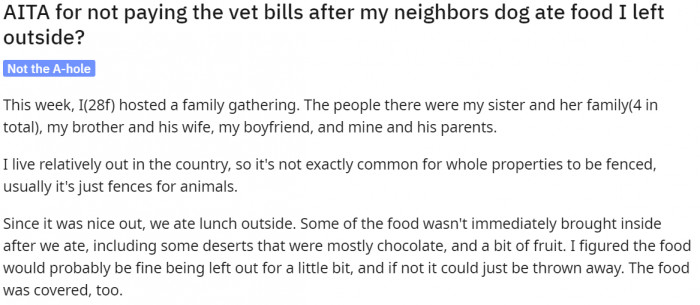
Where the chaos began.

She told her neighbors that she'd pay quarter of the vet bills, but they wanted her to pay all of it.
They were disappointed by how she wanted them to pay for the food that their dog ate. With this, the woman decided to ask Reddit if she was being mean by not paying the vet bills.
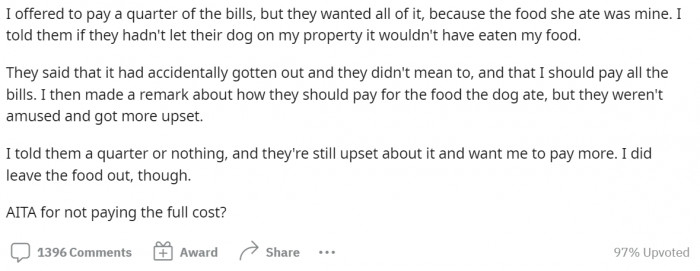
The Ethics of Responsibility in Neighborly Relations
Conflicts between neighbors can often revolve around ethical responsibilities and expectations regarding pets.
According to research in community psychology, disputes like these often stem from differing perceptions of responsibility for shared spaces.
When a pet enters another's property, the expectations of accountability can vary widely, leading to tension.
Examining Emotional Attachment to Pets
Pets often hold a significant emotional place in their owners' lives, leading to intense reactions when conflicts arise. This emotional attachment can complicate situations, particularly when it comes to responsibilities related to health and well-being.
Research from the Journal of Applied Animal Welfare Science indicates that the emotional bonds between pets and their owners can influence decision-making, leading to heightened sensitivity during disputes over responsibilities.
Analyzing Community Dynamics and Responsibility
Dr. Karen Lee, a social psychologist, explains that community dynamics often complicate interpersonal relationships, particularly regarding shared responsibilities.
According to research, individuals may feel a sense of collective responsibility, but personal accountability often gets blurred in such situations.
This can lead to conflict, as seen in the situation described in the article.
#1 It is the owners' fault and their accountability.
This post had urged other Reddit users to give their opinions and experiences in dealing with irresponsible dog owners. These are the comments which had the most votes and replies.
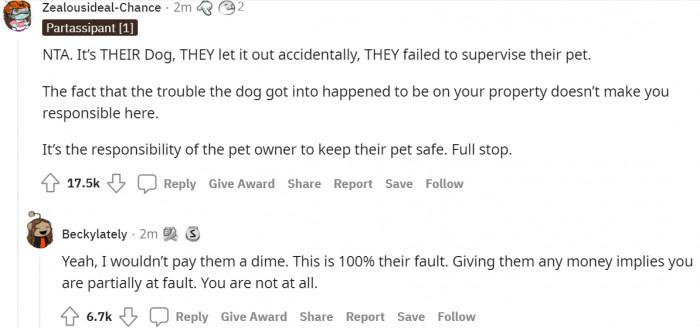
#2 She did not feed the dog intentionally.
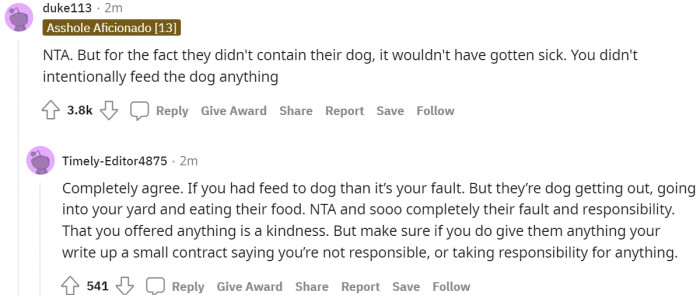
#3 Should not offer to pay the bills.

A social psychologist studying community dynamics points out that social norms often dictate how pet-related conflicts are resolved.
In many communities, there is an expectation that pet owners should be responsible for their pet's actions, which can lead to conflicts when incidents occur.
This underlines the importance of clear communication and setting shared expectations among neighbors regarding pet management.
Additionally, the concept of ‘pet-parenting’ has emerged, where owners see their pets as family members, further intensifying emotional responses. This perspective can lead to conflicts when financial responsibilities, like vet bills, become a point of contention.
Studies suggest that disputes over pet care can mirror broader relationship issues, highlighting the need for effective communication and understanding.
From a behavioral perspective, the reaction of the neighbors reflects a common phenomenon where individuals project their feelings of ownership onto shared spaces.
Studies indicate that this projection can lead to misunderstandings and heightened tensions among neighbors.
Understanding these dynamics can help individuals navigate conflicts more effectively.
#4 The dog was trespassing.

#5 Do not pay for other people's negligence.
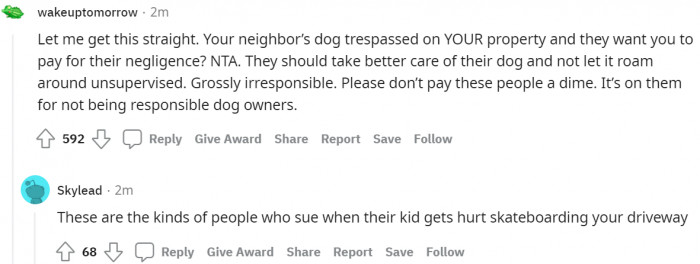
#6 Keep dogs on leashes.
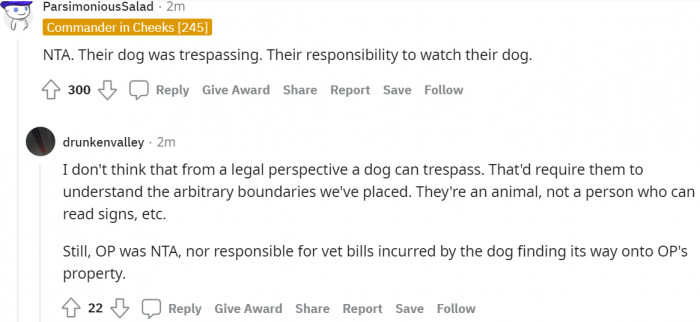
Understanding Pet Ownership and Community Responsibility
Pet ownership carries inherent responsibilities that can impact neighborly relationships.
Research shows that pet owners who actively engage with their community often experience better social connections and reduced conflict.
Building a sense of community through shared values about pet care can mitigate disputes and foster cooperation.
The Role of Accountability in Relationships
Accountability plays a crucial role in managing shared responsibilities, especially concerning pets. When one partner feels that the other isn't sharing the load, it can lead to feelings of resentment and frustration.
Dr. Michele Weiner-Davis, a renowned marriage therapist, states, "Clear communication and shared responsibilities are essential for a harmonious relationship." Her insights can be found on her professional website, divorcebusting.com. Establishing clear expectations can help mitigate these feelings and promote a sense of teamwork.
The Role of Empathy in Neighborhood Relationships
Empathy is vital in maintaining harmony within neighborhoods, especially when conflicts arise.
Research published in the Journal of Community Psychology shows that when individuals practice empathy, they are more likely to resolve disputes amicably.
Encouraging open dialogue can foster a sense of community and understanding.
#7 Get it from home insurance.
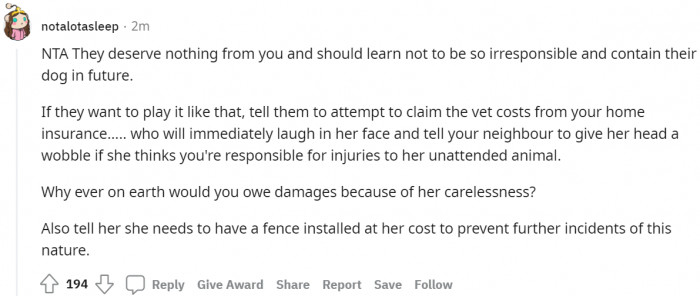
#8 Charge them for the food.

#9 Victim blaming.

To address disputes constructively, open dialogues about expectations and responsibilities can be beneficial.
Studies in conflict resolution emphasize that understanding each party's perspective often leads to more amicable resolutions.
Establishing agreements in advance about pet behavior can prevent misunderstandings and foster better relationships.
Moreover, discussing financial contributions openly can foster accountability and transparency. When both partners agree on how to manage expenses, it can prevent misunderstandings and build trust.
This proactive approach can enhance relationship satisfaction and reduce conflict over shared responsibilities.
Additionally, it’s important to recognize that financial disputes often tap into deeper emotional concerns about trust and security.
Psychological research indicates that when people feel their security is threatened, they may react defensively, leading to further conflict.
Addressing these emotional undercurrents can facilitate healthier conversations about responsibilities.
#10 Too generous for the offer.

#11 Accidents require compensation, too.

#12 What a steal.

The Role of Communication in Resolving Conflicts
Effective communication is key to resolving conflicts in neighborly relationships, especially regarding pets.
Research indicates that active listening and empathetic responses improve conflict resolution outcomes.
Neighbors can benefit from approaching discussions with a mindset of collaboration rather than confrontation.
Navigating Conflict with Empathy
Conflict resolution requires empathy and understanding, especially in emotionally charged situations involving pets. Acknowledging each other's feelings and perspectives can facilitate productive discussions.
Research from the Journal of Family Psychology indicates that couples who practice empathy are more successful in resolving conflicts, as they are able to validate each other’s emotional experiences.
Setting Boundaries and Expectations
Establishing clear boundaries can significantly reduce conflict in neighborhood interactions.
Studies suggest that when individuals are explicit about their expectations, misunderstandings can be minimized.
This clarity helps individuals navigate shared responsibilities without resentment.
#13 Safety first for the pets.

#14 Accidentally theirs.

#15 It's not you. It's them.

Employing techniques such as active listening can further enhance empathy during discussions. By truly hearing each other’s concerns, partners can foster a more collaborative environment, reducing defensiveness and promoting mutual understanding.
This can lead to more successful outcomes when addressing sensitive topics, such as financial responsibilities for pets.
Moreover, enhancing communication skills can play a critical role in resolving neighborhood disputes.
Research shows that individuals who practice active listening and express their feelings constructively tend to experience fewer conflicts.
Building these skills can lead to more positive interactions and stronger community ties.
#16 The audacity.

#17 Your house, your rules.
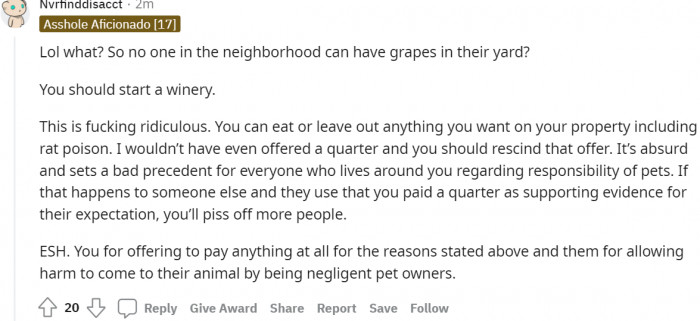
#18 Vet insurance for pet negligence.

The Importance of Joint Decision-Making
Joint decision-making can play a pivotal role in managing shared responsibilities for pet care. When both partners are involved in decisions, it promotes a sense of ownership and commitment to the well-being of the pet.
Research indicates that collaborative decision-making can enhance relationship satisfaction and lead to better outcomes in managing shared responsibilities.
The Importance of Collaboration
Collaboration among neighbors can help foster a sense of shared responsibility.
Research indicates that when individuals work together towards common goals, they create stronger community bonds.
This collaborative spirit can lead to more harmonious interactions and support systems within neighborhoods.
#19 Neighborly relationship versus vet bill.

#20 Where are the leash laws?
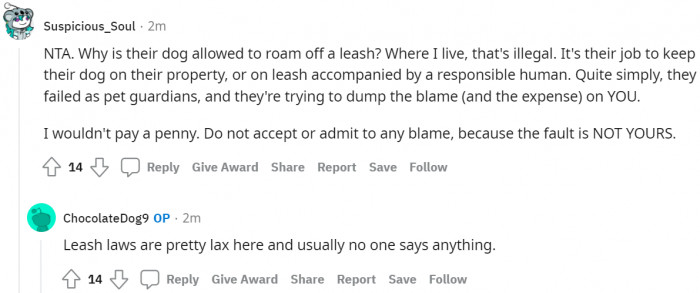
Forcing others to take responsibility will not make things better. In this case, the favor is definitely on her side and it's evident in the way Redditors have responded to her post.
However, even if she's not responsible for the accident, she still offered to pay a quarter which showed her concern for the dog. Not everyone has the heart to do that.
Do you have the same thoughts on this? Share this story with your family and friends!
In summary, navigating neighborhood dynamics requires a deep understanding of community psychology and interpersonal relationships.
By fostering empathy, setting clear boundaries, and enhancing communication, neighbors can create a more supportive and understanding environment.
Addressing conflicts with these strategies can lead to healthier relationships and a stronger sense of community.
Psychological Analysis
This situation illustrates the complexities of community relationships and the emotional factors that often underpin conflicts.
Addressing these deeper issues can lead to more constructive resolutions and a stronger sense of community among neighbors.
Analysis generated by AI
Analysis & Alternative Approaches
Research highlights the importance of empathy and clear communication in neighborhood dynamics.
When individuals take the time to understand each other's perspectives and establish boundaries, they pave the way for more harmonious interactions.
Establishing regular check-ins to discuss pet care can also facilitate joint decision-making. This proactive approach allows partners to address concerns and make adjustments as needed, fostering a supportive partnership.
Ultimately, involving both partners in pet-related decisions strengthens the emotional bond and promotes harmony in the relationship.
Creating a Supportive Environment
Building a supportive environment is essential for managing conflicts related to pet care. When both partners feel safe to express their feelings and concerns, it can reduce defensiveness and promote constructive dialogue.
Research from the Journal of Personality and Social Psychology suggests that creating a space for open communication enhances relationship satisfaction and reduces conflict.
Analysis & Alternative Approaches
Managing shared responsibilities for pets can be challenging, especially when emotions run high. However, employing strategies such as empathy, joint decision-making, and open communication can transform conflicts into opportunities for growth and understanding.
Ultimately, fostering a supportive environment can lead to healthier relationships, ensuring both partners feel valued and heard in their shared responsibilities.
Analysis & Alternative Approaches
In conclusion, navigating pet-related disputes requires a balance of empathy, responsibility, and clear communication.
Community psychology emphasizes that understanding and addressing differing expectations can lead to more harmonious living environments.



